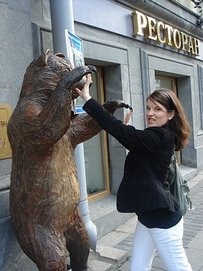 Early this morning, at 1am, I was on the phone with my pal Vinnie, gabbing about a date I had just been on (like how I threw that in?) - when both our flats started shaking. She heard a noise and was like, "Did you hear that?" and I was like, "hear what?" and she said, "sounds like rain, or like the boiler just kicked on." And I said, "OMG, my apartment is totally shaking, what's going on?! Is your apartment shaking??" and she was like, "Ya man, what's up with that?" And I said, "Wait, we live 45 minutes apart from each other, why are both our flats shaking?" And she said, "Maybe it's an explosion." And I said, "I think it's an earthquake!" Then, about 15 seconds later, it stopped. In true Brit fashion, Vinnie was like, "Ok, I'm going to bed, goodnight." And in typical American fashion, I freaked, picked up the phone, dialed my brother-in-law, and when he wasn't excited enough for my liking, I called my mom (who was sufficiently excited), and then I kept the BBC on and surfed the Internet until it was confirmed at about 1:35am that "Earth Tremor Felt Across Britain!" Epicentered (is that a verb?) up North in Lincolnshire, it was a 5.2 on the Richter Scale (which my colleague from Mexico City scoffed at today, proclaiming, "HA! That's Nothing!!!"). But for me it was totally something, because when you haven't felt the earth move before it is really something to behold. But that's about as much earth movement as I think I ever want to feel. I went to bed cautiously, but very excited to get to work this morning so we could all talk about, "What were YOU doing when the tremor happened??" But I must say the "stories" lasted far less time than the tremor itself and were not very interesting - seems I was the most excited of the bunch - and I am definitely the most nocturnal since most people simply slept through it (except those people near Lincolnshire of course, who had more shaking than the rest of us). No one was hurt though, thank goodness!
Early this morning, at 1am, I was on the phone with my pal Vinnie, gabbing about a date I had just been on (like how I threw that in?) - when both our flats started shaking. She heard a noise and was like, "Did you hear that?" and I was like, "hear what?" and she said, "sounds like rain, or like the boiler just kicked on." And I said, "OMG, my apartment is totally shaking, what's going on?! Is your apartment shaking??" and she was like, "Ya man, what's up with that?" And I said, "Wait, we live 45 minutes apart from each other, why are both our flats shaking?" And she said, "Maybe it's an explosion." And I said, "I think it's an earthquake!" Then, about 15 seconds later, it stopped. In true Brit fashion, Vinnie was like, "Ok, I'm going to bed, goodnight." And in typical American fashion, I freaked, picked up the phone, dialed my brother-in-law, and when he wasn't excited enough for my liking, I called my mom (who was sufficiently excited), and then I kept the BBC on and surfed the Internet until it was confirmed at about 1:35am that "Earth Tremor Felt Across Britain!" Epicentered (is that a verb?) up North in Lincolnshire, it was a 5.2 on the Richter Scale (which my colleague from Mexico City scoffed at today, proclaiming, "HA! That's Nothing!!!"). But for me it was totally something, because when you haven't felt the earth move before it is really something to behold. But that's about as much earth movement as I think I ever want to feel. I went to bed cautiously, but very excited to get to work this morning so we could all talk about, "What were YOU doing when the tremor happened??" But I must say the "stories" lasted far less time than the tremor itself and were not very interesting - seems I was the most excited of the bunch - and I am definitely the most nocturnal since most people simply slept through it (except those people near Lincolnshire of course, who had more shaking than the rest of us). No one was hurt though, thank goodness!Here is the OFFICIAL news report from MSN UK:
A "significant" earthquake which hit the UK resulted in at least one injury and damage likely to run into millions of pounds.
The Association of British Insurers said that the cost of damage to homes and property is likely to be in excess of £10 million.
The tremor hit at around 1am and was measured at 5.2 on the Richter scale.
Its epicentre was near Market Rasen, Lincolnshire, but emergency services across the UK received calls following the incident.
The British Geological Survey (BGS) initially gave the magnitude for the 12.56am earthquake as 5.3 on the Richter scale but has now said it was closer to 5.2.
It said the centre was 8km east of Market Rasen, Lincolnshire, and 22km south west of Grimsby.
Seismologist Dr Brian Baptie of the BGS said: "This is a significant earthquake for the UK and will have been widely felt across England and Wales."
The BGS said it records around 200 earthquakes in the UK each year - an eighth of which are able to be felt by residents.
It said earthquakes of this size occur in the mainland UK around every 30 years but are more common in offshore areas.
Wednesday's quake is the largest since 1984 when an earthquake measuring 5.4 on the Richter scale shook the Lleyn Peninsula of north Wales and was widely felt across England and Wales.
A "significant" earthquake which hit the UK resulted in at least one injury and damage likely to run into millions of pounds.
The Association of British Insurers said that the cost of damage to homes and property is likely to be in excess of £10 million.
The tremor hit at around 1am and was measured at 5.2 on the Richter scale.
Its epicentre was near Market Rasen, Lincolnshire, but emergency services across the UK received calls following the incident.
The British Geological Survey (BGS) initially gave the magnitude for the 12.56am earthquake as 5.3 on the Richter scale but has now said it was closer to 5.2.
It said the centre was 8km east of Market Rasen, Lincolnshire, and 22km south west of Grimsby.
Seismologist Dr Brian Baptie of the BGS said: "This is a significant earthquake for the UK and will have been widely felt across England and Wales."
The BGS said it records around 200 earthquakes in the UK each year - an eighth of which are able to be felt by residents.
It said earthquakes of this size occur in the mainland UK around every 30 years but are more common in offshore areas.
Wednesday's quake is the largest since 1984 when an earthquake measuring 5.4 on the Richter scale shook the Lleyn Peninsula of north Wales and was widely felt across England and Wales.









